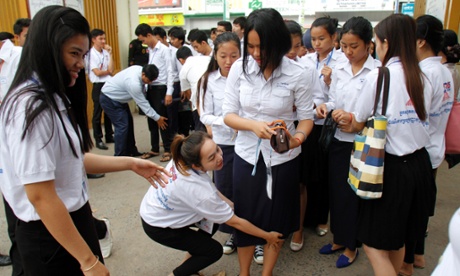Protesters gather at a burning improvised roadblock on Veng Sreng Boulevard in Phnom Penh during clashes with police that turned deadly in January.
A union leader has been charged with causing violence and destroying property during a garment strike that ended in security forces shooting dead at least five people on January 3, a court summons obtained yesterday shows.
Pav Sina, president of the Collective Union of Movement of Workers (CUMW), must appear in Phnom Penh Municipal Court for questioning on September 12 over the strike on the capital’s Veng Sreng Boulevard, the summons says.
“I, Chea Sokheang, an investigating judge … charge Pav Sina with intentional violence in aggravating circumstances, intentional damage and threats to damage and make an obstacle to traffic in front of the Canadia Industrial Park … between December 25, 2013, and January 3, 2014,” it reads.
Sina, who faces arrest if he does not attend the hearing, denied the charges and said court officials had told him that leaders of five other unions involved in the December and January minimum wage strikes would also be summonsed.
One of them, Ath Thorn, president of the Coalition of Cambodian Apparel Workers Democratic Union (C.CAWDU), said he had not yet received a summons but expected to.
“I saw a complaint when I went to the court last week,” Thorn said. “I saw the summons; [an official] showed it to me.”
Thorn alleged that the Garment Manufacturers’ Association in Cambodia was behind the complaint.
“GMAC are representing more than 170 [factories],” he said.
In February, the Post reported that 170 factories had sought GMAC’s help to file lawsuits against a number of major independent or opposition-aligned unions.
Reached yesterday, GMAC Secretary-General Ken Loo said he didn’t know if the summons was related to GMAC’s complaint, but said the factories association “absolutely” wanted an outcome.
“I was called to the investigation last week,” he said. “We are asking the court to rule as to who should be responsible for the losses, who should be responsible for the violent demonstrations.”
Sokheang, the investigating judge, declined to comment, while prosecutors in the case could not be reached.
Sina said that neither he nor his members had attended the Veng Sreng strikes. The charges against him, he added, showed “the government’s intentions to frighten us as we continue our demands for a higher minimum wage”.
The charges follow recent minimum-wage talks involving major garment unions and come despite no results in a government investigation into the deadly violence of January 3 being made public.
“I’m disappointed with the authorities that they didn’t find the perpetrators who shot workers, but have instead turned their interests to the activities of those protecting the workers’ livelihoods,” Sina said.
When asked about the results of the government investigation, Khieu Sopheak, Ministry of Interior spokesman, said no further information would be released.
“We have already investigated, and it has already been approved,” he said.
Labour rights groups yesterday said they were shocked at the timing of the charges against Sina.
“It’s amazing. I can only assume there’s been a miscommunication [in the judicial system],” said Dave Welsh, country manager for Solidarity Center. “If this is the direction [the government] is taking, it’s the worst possible thing they can do. We seemed to have moved past this.”
Moeun Tola, head of the labour program at the Community Legal Education Center, said he believed the timing was “intentional”.
“The court is being used again as the minimum wage deadline nears.”
After demanding $160 per month during last year’s strikes, unions are this year asking for $177. The government’s Labour Advisory Council will rule on the increase in October, to be applied in January.







